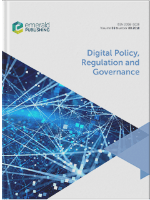
Digital Policy Regulation and Governance
Scope & Guideline
Navigating the Future of Digital Governance
Introduction
Aims and Scopes
- Digital Governance:
Investigates how digital technologies are integrated into governance structures, including e-government initiatives and the role of technology in enhancing public service delivery. - Regulatory Frameworks:
Examines the development and impact of regulations governing digital technologies, including data protection, cybersecurity, and digital finance. - Socio-Economic Impacts of Digital Technologies:
Analyzes the implications of digitalization on various socio-economic factors, such as financial inclusion, economic growth, and quality of life. - Emerging Technologies and Innovation:
Focuses on the adoption and regulation of emerging technologies such as blockchain, artificial intelligence, and mobile financial services. - Comparative Policy Analysis:
Conducts comparative studies of digital policies across different countries and regions to identify best practices and lessons learned.
Trending and Emerging
- Data Protection and Privacy Regulations:
Increasing publications on data protection regulations, particularly in a comparative context, highlight the growing importance of privacy in digital governance. - FinTech and Digital Finance Innovations:
A notable rise in research focused on FinTech and its regulatory implications, reflecting the rapid growth of digital financial services and their impact on economies. - Cybersecurity and Risk Management:
Emerging themes around cybersecurity practices and frameworks to mitigate risks associated with digital services are gaining prominence, especially in light of recent global cyber threats. - Impact of Digitalization on Quality of Life:
Growing attention to the empirical impacts of the digital economy on quality of life indicates a shift towards understanding the societal implications of technology. - Blockchain Applications in Governance:
An increasing focus on the applications of blockchain technology in various sectors, including governance and supply chain management, reflects its rising significance.
Declining or Waning
- Traditional E-Government Models:
Earlier focuses on traditional e-government models and their implementation challenges are becoming less frequent, as attention shifts toward more dynamic digital governance frameworks. - Basic Telecommunications Regulation:
Studies centered on basic telecommunications regulation are waning, likely due to the growing complexity of issues related to 5G and other advanced technologies. - Static Privacy Policies:
Research focusing on static privacy policy frameworks is declining, with a shift towards examining dynamic and multifaceted approaches to data protection. - General Technology Adoption Studies:
Broad studies on technology adoption without specific context or focus are becoming less common, as the journal increasingly emphasizes contextualized and sector-specific research.
Similar Journals

Information Polity
Unveiling the Future of Politics in the Information AgeInformation Polity is a leading international journal published by IOS PRESS, focusing on the intersection of information technologies and governance within the ever-evolving landscape of political science and public administration. With an ISSN of 1570-1255 and an E-ISSN of 1875-8754, this journal presents high-quality research that examines how information systems influence public policy and societal outcomes. Recognized for its prestigious standing, Information Polity holds a Q2 ranking in multiple categories, including Communication, Geography, Planning and Development, Information Systems, and Sociology and Political Science, reflecting its impact and relevance in these fields. Researchers and practitioners can delve into seminal studies that explore critical issues such as digital governance, data management, and the role of technology in participatory democracy. Established in 2002 and continuing through 2024, this journal is essential for anyone invested in understanding the complex relationships between information contexts and political processes in our increasingly digital world.

Pacific Asia Journal of the Association for Information Systems
Connecting Practitioners and Scholars in the Digital EraPacific Asia Journal of the Association for Information Systems (ISSN: 1943-7536, E-ISSN: 1943-7544) is a leading academic journal published by the Association for Information Systems, based in the United States. With a focus on cutting-edge research in Information Systems, Human-Computer Interaction, and Management Information Systems, this journal is vital for researchers, practitioners, and students who seek to explore the complexities and innovations in these fields. It boasts notable Scopus rankings, including a Q2 classification in Information Systems and Management, indicating its pivotal role in driving scholarly dialogue and advancing knowledge within the discipline. The journal offers rich insights into both theoretical and practical aspects, fostering collaboration and discovery among its readership. Recognizing the importance of Open Access in promoting knowledge dissemination, the journal continues to strive towards making impactful research accessible to a wider audience. With a commitment to excellence and thought leadership, the Pacific Asia Journal is an invaluable resource for anyone engaged in the evolution of information systems.
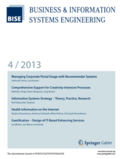
Business & Information Systems Engineering
Empowering Research for Tomorrow's Business ChallengesBusiness & Information Systems Engineering is a premier journal dedicated to the intersection of business and information systems, published by SPRINGER VIEWEG-SPRINGER FACHMEDIEN WIESBADEN GMBH in Germany. With an impressive 2023 impact factor placing it in the Q1 category in Information Systems, this journal stands out for its rigorous peer-reviewed research that addresses the dynamic challenges faced by businesses in the digital age. Spanning from 2009 to 2024, it showcases empirical studies, theoretical frameworks, and practical applications, ensuring relevance for both researchers and practitioners alike. As part of the Scopus rankings, it is recognized within the top 93rd percentile in the field of Computer Science, specifically Information Systems, ranking #26 out of 394 journals. Currently, the journal operates under a non-open access model, thus providing a platform for high-quality research while maintaining exclusivity. Engaging with this journal is essential for anyone looking to stay at the forefront of developments in business and technology integration.
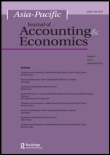
Asia-Pacific Journal of Accounting & Economics
Fostering scholarly dialogue in accounting and economics.Asia-Pacific Journal of Accounting & Economics, published by Routledge Journals, Taylor & Francis Ltd, is a prestigious platform dedicated to advancing scholarly research in the fields of accounting, economics, and finance. Established in 2000 and converging its academic rigor through 2024, this journal serves as an essential resource for researchers, professionals, and students seeking to explore the interconnections and complexities within these disciplines. With a notable impact reflected in its Q3 rankings in Accounting, Economics, and Finance, the journal showcases the latest empirical research and theoretical advancements. Although it operates under a traditional access model, its commitment to quality and relevance in the Asia-Pacific region continues to make it a vital publication for those aiming to contribute to the understanding of economic dynamics and financial practices. Researchers and professionals are encouraged to engage with the articles herein to stay abreast of new insights and methodologies shaping the landscape of accounting and economics.
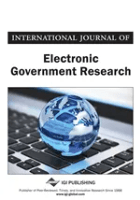
International Journal of Electronic Government Research
Exploring the Intersection of Technology and GovernanceThe International Journal of Electronic Government Research, an esteemed publication by IGI GLOBAL, serves as a vital resource for researchers and professionals engaged in the evolving field of electronic governance and technology-driven public services. With an ISSN of 1548-3886 and a robust E-ISSN of 1548-3894, this journal has established itself as a notable contributor to the literature since its inception in 2005. Covering a wide array of subjects including Computer Networks and Communications, E-learning, Software, and Social Sciences, the journal is recognized for its influence, marked by its Q2 and Q3 category quartiles across various disciplines in 2023. Despite not offering Open Access, it garners attention through its significant rankings in Scopus, standing at the 67th percentile in General Social Sciences and 40th in Computer Networks and Communications. By bridging theoretical insights and practical applications, the journal aims to foster innovative research and discussions that pave the way for smarter governance practices in the digital age, making it essential reading for scholars and practitioners alike.
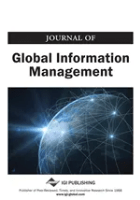
Journal of Global Information Management
Elevating Practices in a Knowledge-Centric WorldWelcome to the Journal of Global Information Management, a premier academic publication dedicated to advancing the fields of Business, Information Systems, Computer Science, and Management. Published by IGI Global, this esteemed journal holds a remarkable position in the academic community, boasting a Q1 ranking in Business and International Management and consistent Q2 standings across a variety of related disciplines, including E-learning and Strategy and Management. With an established publication period from 2002 to 2024, this journal serves as a critical platform for researchers, practitioners, and students eager to share innovative insights and contribute to knowledge formation in a rapidly evolving global environment. The journal emphasizes rigorous research and theoretical advancements, ensuring valuable contributions that enhance the understanding and application of information management across diverse sectors. Join us on this journey to explore and refine the practices that shape our digital and knowledge-centric world.
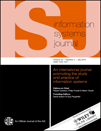
INFORMATION SYSTEMS JOURNAL
Advancing the Frontiers of Information Systems ResearchINFORMATION SYSTEMS JOURNAL, published by Wiley, is a prestigious academic journal dedicated to advancing the field of information systems, encompassing key areas such as computer networks, communication technologies, and software engineering. With an impressive track record of more than three decades, since its inception in 1991, the journal has secured a prominent position reflected in its Q1 rankings across multiple categories in 2023, placing it among the top-tier journals in Computer Networks and Communications, Information Systems, and Software. It boasts outstanding Scopus ranks, with percentiles in the 90s, positioning it as a vital source of cutting-edge research for professionals, academics, and students aiming to enhance their knowledge and contribute to the evolving landscape of information technology. Although it does not currently offer open access, the journal welcomes contributions that bridge theoretical insights with practical applications, fostering a dialogue among researchers and practitioners in the fast-paced world of information systems.
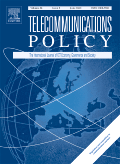
TELECOMMUNICATIONS POLICY
Leading the Dialogue in Telecommunications and Information SystemsTELECOMMUNICATIONS POLICY, published by ELSEVIER SCI LTD, is a leading journal recognized for its contributions to the fields of telecommunications, information systems, and policy development. With a rich publication history dating back to 1976 and converging its expertise until 2024, this journal maintains a prestigious standing in Q1 quartile rankings across multiple disciplines, including Economics, Electrical and Electronic Engineering, and Management. Its outstanding Scopus ranking reflects its impact, with high percentiles across key areas such as Communication, Library and Information Sciences, and Management Information Systems, thereby establishing it as an essential resource for researchers and professionals alike. Although TELECOMMUNICATIONS POLICY does not offer open access, it provides valuable insights, innovative research articles, and policy analyses that illuminate contemporary challenges in the telecommunications sector and beyond. The journal continues to be an indispensable platform for those seeking to contribute to and engage with the ever-evolving landscape of telecommunications policy and its implications for society.
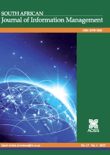
South African Journal of Information Management
Shaping the future of information management in South Africa.South African Journal of Information Management (ISSN: 2078-1865; E-ISSN: 1560-683X), published by AOSIS, stands as a pivotal platform within the field of information management, dedicated to advancing scholarly research and practical insights since its inception in 1999. Operating under an Open Access model, this journal ensures that a diverse range of research—from theoretical discussions to empirical studies—remains accessible to scholars, practitioners, and students globally. With a focus on the intricacies of information management, the journal addresses critical issues such as data governance, knowledge management, and the impact of technology in South Africa and beyond. It provides a constructive avenue for disseminating innovative ideas and best practices, thereby contributing significantly to the ongoing discourse in the realm of information studies. Aspiring authors and researchers will find the journal's commitment to high-quality peer-reviewed content an excellent avenue for sharing their findings and engaging with a vibrant community of thought leaders.

Central European Public Administration Review
Fostering insights that shape public administration today.Central European Public Administration Review is a distinguished academic journal published by UNIVERSITY OF LJUBLJANA, FACULTY OF PUBLIC ADMINISTRATION, specializing in the field of public administration and law. Since its inception in 2019, the journal has dedicated itself to advancing knowledge and understanding of public administration policies and practices in Central Europe and beyond. With an impressive Scopus Rank in both the Social Sciences (Law) at Rank #239/1025 and Public Administration at Rank #122/232, placing it in the 76th and 47th percentiles respectively, the journal stands as a vital resource for researchers, professionals, and students. Although currently not listed as open access, it serves as a significant platform for innovative research that fosters dialogue and enhances public policy formulation. As it converges its academic influence through 2024, Central European Public Administration Review remains committed to publishing high-quality, peer-reviewed articles that address pressing issues in public administration, offering insights that are both practical and theoretical.